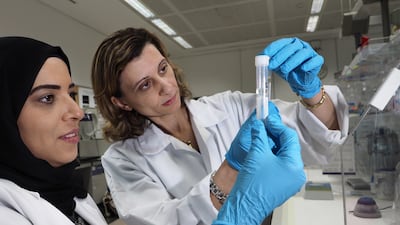Although it is too soon to write off Covid-19 as yesterday’s news, it is fair to say that the UAE government has been a world leader in managing the pandemic. But as life continues to return to normal, it is essential that we renew our focus on other important issues, including diabetes.
When the UAE was formed 50 years ago, diabetes was almost unheard of among the local population who, though poor, were physically active and ate natural food. This has changed significantly in the intervening decades as a side effect of the nation’s astonishing development. Diabetes is now one of the UAE’s most common diseases, with 30 per cent of the population either diabetic or pre-diabetic according to Dubai Health Authority.
Yet Type 2 diabetes, which affects most diabetes sufferers, is preventable in nearly half of all cases. So if we’re looking to improve the well-being of our community, our goal must be to reverse the trend through a combination of prevention and treatment. And that will require the full force of the UAE’s technological capabilities.
We can’t change our genes, or the way our genes are expressed, so the only available changes we can make are in lifestyle. And the good news is that contrary to what we thought until quite recently, it is possible to reverse Type 2 Diabetes through significant weight loss, though this requires major lifestyle changes.
It will be much more effective to focus on prevention, however, because it is much more difficult to lose weight than it is to not gain it in the first place. Data suggests that if you intervene early with school-based interventions, you can start to reverse childhood obesity. And that’s important because obese children tend to become obese adults.
General health campaigns haven’t got a great track record, but we can make better use of social media to send very targeted messaging. We talk a lot about personalised medicine in relation to treatment of a disease, but it should also be possible for prevention.
We can also make use of technology, apps and wearable devices to have a better idea of our calorie intake and our calorie usage through exercise.
The UAE’s focus on becoming a research and development-focused economy could see it take a lead in developing more comprehensive diabetes prevention and treatments. For example, diabetics in Abu Dhabi are now being fitted with smart insulin pumps that act as an alternative to the pancreas.
The Emirati Genome Project, which aims to collect DNA samples from the entire Emirati population, is already well under way. This will provide valuable data to help develop polygenic risk scores that inform people of their genetic susceptibility to diabetes.
There might be opportunities for the UAE to develop an early biomarker for diabetes, rather than leaving professionals to rely on blood sugar measurements, which would again allow for crucial early interventions.

The UAE is also keen to develop new drugs for treatment and it now has the infrastructure to do clinical trials, which we saw during Covid-19 when it led one of the world’s largest vaccine studies.
And the other big advantage we have in the UAE is the introduction of electronic medical records, which makes it easier to find patients who require treatment and to monitor them during clinical trials.
Looking further ahead, global researchers are looking at ways to regenerate the pancreas, which produces insulin and becomes less effective over time in Type 2 diabetes. Using stem cells and other technologies to revive the pancreas would be a game changer for diabetes sufferers. And there is no reason why the UAE can’t be a frontrunner in this type of research, given the access it has to data and technology, allied with its forward-thinking approach.
Looking at the future, we believe it is realistic to make diabetes a more manageable disease that has a less detrimental impact on life expectancy than it does now.
We hope the UAE Healthy Future Study – an ongoing project initiated by the Public Health Research Department of NYU Abu Dhabi, in collaboration with all healthcare stakeholders across the UAE and in which Emiratis can register to take part on the project's website – will contribute to this increase in knowledge. Our aim is to assess risks of chronic diseases – including diabetes – among Emiratis, by examining real-time data from more than 20,000 Emiratis, aged 18 and above. This will allow us to quantify key risk factors and assess the relative importance of diet, physical activity and other behaviours, versus genetics and epigenetics. This information will tell us where we need to focus on interventions.
Just as technology was key to successfully managing the Covid-19 pandemic, the rapid modernisation of this nation enables us to use technology and collect data in ways that will help combat the silent but all too often deadly scourge of diabetes.
Dr Raghib Ali is director of the NYU Abu Dhabi Public Health Research Center and founder of the UAE Healthy Future Study










